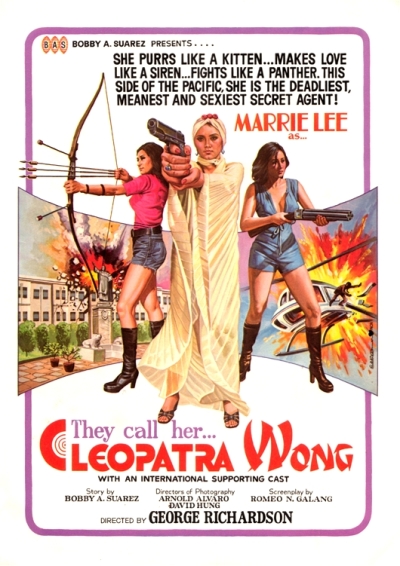★★
“Run Goldine Run”
 And Frankenstein Created Woman? That might have been an alternate title, with German scientist Dr. Serafin (Jurgens) in the role of the creator – he’s a man with a dubious past, and whispers of involvement in Nazi experimentation. Now “rehabilitated” to the US, in what may be a medical version of Operation Paper Clip, he uses an unholy mix of pharmaceuticals and extreme training methods to convert his own daughter, Goldine, into a 6’2″ athletic superwoman, with the aim of completing an unheard of triple crown at the upcoming Moscow Olympics, winning the 100, 200 and 400 metre gold medals. To fund this work, he brings in a consortium of businessmen who aim to capitalize on Goldine’s success with advertising, merchandising, etc. Brought in to advise them, as Goldine is prepared for her first public events, is agent Jack Dryden (Coburn), who gradually realizes the one person not wholeheartedly committed to the entire proceedings, is the runner herself.
And Frankenstein Created Woman? That might have been an alternate title, with German scientist Dr. Serafin (Jurgens) in the role of the creator – he’s a man with a dubious past, and whispers of involvement in Nazi experimentation. Now “rehabilitated” to the US, in what may be a medical version of Operation Paper Clip, he uses an unholy mix of pharmaceuticals and extreme training methods to convert his own daughter, Goldine, into a 6’2″ athletic superwoman, with the aim of completing an unheard of triple crown at the upcoming Moscow Olympics, winning the 100, 200 and 400 metre gold medals. To fund this work, he brings in a consortium of businessmen who aim to capitalize on Goldine’s success with advertising, merchandising, etc. Brought in to advise them, as Goldine is prepared for her first public events, is agent Jack Dryden (Coburn), who gradually realizes the one person not wholeheartedly committed to the entire proceedings, is the runner herself.
This is a curious period piece, which almost feels like it’s set in an alternate universe – as history turned out, Russia invaded Afghanistan and the United States ended up boycotting those 1980 Olympics entirely. This does have some interesting things to say about parents who force their own ambitions onto their offspring, without considering their childrens’ desires, or even best interests, and also about the “shamateurism” of the Olympics. However, this is countered by some odd aspects such as Goldine’s vibrator-based press conference training, whose mere description appears to have strayed in from an entirely different movie. The film would also have benefited from a greater focus on the heroine, and what she wants out of life; that’s an area left almost entirely unexplored, with Goldine left more as a palimpsest for the demands of others.
Even if a couple of inches short of the necessary height at 5’11”, Anton, a former Miss California, certainly makes a striking figure, and the film wastes no opportunity to show off her… er., striking figure. Though when you see her competing, many of those against whom she races were actual athletes, and the difference between their, much more heavily muscled physiques, and her wispy frame is obvious. Bill Conti’s score occasionally threatens to overpower everything, most notably during the musical training montage number, also sung by Anton. However, even if its more of a “Good effort!” than an Olympic champion, it remains one of the few sports movies with a focus on the women’s side of the stadium.
Dir: Joseph Sargent
Star: Susan Anton, James Coburn, Curt Jurgens, Leslie Caron





 This review is more in the nature of a warning than a critique, since it would be easy for someone to look at the cover (right) and think that this might be a movie about – oh, I dunno, boxing? It seems a reasonable expectation, given the following synopsis:
This review is more in the nature of a warning than a critique, since it would be easy for someone to look at the cover (right) and think that this might be a movie about – oh, I dunno, boxing? It seems a reasonable expectation, given the following synopsis: Roger Corman’s New World Pictures weren’t the only ones using the Philippines as a factory to churn out B-movies in the seventies, as this 1973 entry, from Arthur Marks’ General Film Corproration shows. Dr. Tsu (Kwan) and her posse of henchwomen are kidnapping athletes, the not-so-good doctor having perfected the ability to do brain transplants. She’s now selling this as a service to rich, old people, who can become young again. However, after kidnapping a jai-alai star, the insurance company on the hook for the half million dollar policy hires Mike Harber (Hagen) to investigate. As he starts nosing around and making waves, first the local gangster boss, then Dr. Tsu, send their minions out to stop him. Needless to say, this is of limited success, and he is soon on his way to the remote island where Tsu operates, to take down her operation.
Roger Corman’s New World Pictures weren’t the only ones using the Philippines as a factory to churn out B-movies in the seventies, as this 1973 entry, from Arthur Marks’ General Film Corproration shows. Dr. Tsu (Kwan) and her posse of henchwomen are kidnapping athletes, the not-so-good doctor having perfected the ability to do brain transplants. She’s now selling this as a service to rich, old people, who can become young again. However, after kidnapping a jai-alai star, the insurance company on the hook for the half million dollar policy hires Mike Harber (Hagen) to investigate. As he starts nosing around and making waves, first the local gangster boss, then Dr. Tsu, send their minions out to stop him. Needless to say, this is of limited success, and he is soon on his way to the remote island where Tsu operates, to take down her operation. Part one was deemed by the qualification panel as falling short of the necessary minimum level for inclusion here, being a mix of poignant drama about an elderly man whose lifelong companion’s battery is running down, and porn. The sequel, however, just about does enough to qualify, albeit while retaining a hefty dose of the latter aspect – and you don’t need to have seen part one either. Here, disgruntled scientist Professor Uegusa (Horiken) hatches a plan to destroy the appearance-based culture of romance, and to finance this sends out his “hostroids”, attractive male androids, in a variety of guises, e.g. office manager, door-to-door salesman, etc. to seduce woman and bilk them of their savings. He also sends them to kill rival researcher Dr. Kouenji, who had been building a countermeasure, in the form of a maid android, Maria (Yoshizawa). Before his death, Kouenji sends Maria to geeky student Shotarou (Haraguchi), but she isn’t ready, needing her “love circuit” activated before she can attain her full potential needed to defeat Uegusa and the hostroids. Can Shotarou manage that final step before the hostroids take him and Maria down?
Part one was deemed by the qualification panel as falling short of the necessary minimum level for inclusion here, being a mix of poignant drama about an elderly man whose lifelong companion’s battery is running down, and porn. The sequel, however, just about does enough to qualify, albeit while retaining a hefty dose of the latter aspect – and you don’t need to have seen part one either. Here, disgruntled scientist Professor Uegusa (Horiken) hatches a plan to destroy the appearance-based culture of romance, and to finance this sends out his “hostroids”, attractive male androids, in a variety of guises, e.g. office manager, door-to-door salesman, etc. to seduce woman and bilk them of their savings. He also sends them to kill rival researcher Dr. Kouenji, who had been building a countermeasure, in the form of a maid android, Maria (Yoshizawa). Before his death, Kouenji sends Maria to geeky student Shotarou (Haraguchi), but she isn’t ready, needing her “love circuit” activated before she can attain her full potential needed to defeat Uegusa and the hostroids. Can Shotarou manage that final step before the hostroids take him and Maria down? “Cleopatra Wong is Asian Interpol’s answer to James Bond, Flint, Cleopatra Jones and Stacey.” Well, less an answer, more like a repetition of the question, since this is firmly in “cheap Asian knock-off” market, though has some charm in its first half. Wong (Lee) is an agent, assigned to investigate a flood of near-undetectable counterfeit money which is flooding the markets in Hong Kong, the Philippines and elsewhere in the far East. It’s happening in such volume, there’s potential to destabilize the entire economies of the affected countries. She takes down the Singapore branch of the operation, and then discovers the money is being transported in shipments of strawberry jam, emanating from a monastery north of Manilla. After finding them to be not exactly a social order, Wong takes pictures by flying over their compound, which shows that these nuns have some nasty habits – specifically, they’re brothers rather than sisters, and concealing automatic weapons under their vestments. Time for Cleo to assemble and lead a team of crack agent in a raid on the convent, take out the bad guys, rescue the real nuns and save the world for free-market capitalism.
“Cleopatra Wong is Asian Interpol’s answer to James Bond, Flint, Cleopatra Jones and Stacey.” Well, less an answer, more like a repetition of the question, since this is firmly in “cheap Asian knock-off” market, though has some charm in its first half. Wong (Lee) is an agent, assigned to investigate a flood of near-undetectable counterfeit money which is flooding the markets in Hong Kong, the Philippines and elsewhere in the far East. It’s happening in such volume, there’s potential to destabilize the entire economies of the affected countries. She takes down the Singapore branch of the operation, and then discovers the money is being transported in shipments of strawberry jam, emanating from a monastery north of Manilla. After finding them to be not exactly a social order, Wong takes pictures by flying over their compound, which shows that these nuns have some nasty habits – specifically, they’re brothers rather than sisters, and concealing automatic weapons under their vestments. Time for Cleo to assemble and lead a team of crack agent in a raid on the convent, take out the bad guys, rescue the real nuns and save the world for free-market capitalism.
 Ellen (Lee) and Grace (Kim) are police officers, who are first on to arrive when the latest victim of a serial sexual predator is found in a dumpster. After a brief diversion to catch a purse snatcher – really, how dumb must you be to do that at a murder scene? – they are sent undercover as nightclub hostesses, since that’s the profession of all the victims. While fending off both lecherous customers and employers, they stumble across an arms smuggling outfit, whose leader Bill (Tsui) has pulled a fast one over his Yakuza partners, with the help of a hired hitwoman (Oshima, whose character in the end credits is named as, I kid you not, “Japanese Jap”!). Rather than letting their superiors know, they decided to investigate themselves. Probably not the wisest of moves: as they’ll discover by the end of the movie, discretion is indeed the better part of valour…
Ellen (Lee) and Grace (Kim) are police officers, who are first on to arrive when the latest victim of a serial sexual predator is found in a dumpster. After a brief diversion to catch a purse snatcher – really, how dumb must you be to do that at a murder scene? – they are sent undercover as nightclub hostesses, since that’s the profession of all the victims. While fending off both lecherous customers and employers, they stumble across an arms smuggling outfit, whose leader Bill (Tsui) has pulled a fast one over his Yakuza partners, with the help of a hired hitwoman (Oshima, whose character in the end credits is named as, I kid you not, “Japanese Jap”!). Rather than letting their superiors know, they decided to investigate themselves. Probably not the wisest of moves: as they’ll discover by the end of the movie, discretion is indeed the better part of valour… Life in the old West was tough. It was particularly tough if you were a woman, such as Sarah Ramírez (Jones), struggling to make an honest living with her farmer husband Miguel (Noriega), having escaped life as a prostitute. This movie shows it to be especially tough, after Miguel has had his throat slit by batty preacher Prophet Josiah (Isaacs) – it doesn’t help he has the hots for Sarah, apparently taking the “love thy neighbour” line very literally, and runs the local area as if it were his own personal fiefdom. Fortunately, she has an unusual ally in Sheriff Jackson (Harris). The lawman shows up, looking for two people who disappeared on a journey which took them right across Josiah’s territory, and is about the only other person willing to stand up to the lunatic religious fringe. Finally, Sarah has had enough, and embarks on her vengeance against, not only Josiah, but anyone else who has wronged her, such as the shopkeeper who spied on her in his changing-room.
Life in the old West was tough. It was particularly tough if you were a woman, such as Sarah Ramírez (Jones), struggling to make an honest living with her farmer husband Miguel (Noriega), having escaped life as a prostitute. This movie shows it to be especially tough, after Miguel has had his throat slit by batty preacher Prophet Josiah (Isaacs) – it doesn’t help he has the hots for Sarah, apparently taking the “love thy neighbour” line very literally, and runs the local area as if it were his own personal fiefdom. Fortunately, she has an unusual ally in Sheriff Jackson (Harris). The lawman shows up, looking for two people who disappeared on a journey which took them right across Josiah’s territory, and is about the only other person willing to stand up to the lunatic religious fringe. Finally, Sarah has had enough, and embarks on her vengeance against, not only Josiah, but anyone else who has wronged her, such as the shopkeeper who spied on her in his changing-room.









 I don’t review movies without subtitles very often. This would be a good reason why. I knew very little about this going in: there’s no IMDB entry, no other reviews appear to exist, and virtually the only Google hits are the range of more or dubious sites from which you can download the movie. Subtitles? Don’t make me laugh. That no-one has done so indicates one of two things: no-one was interested enough to do so, or it’s difficult to subtitle a movie with one hand, if you know what I mean, and I think you do. Either way, it leaves me in a difficult spot: any or all of what follows may be wildly inaccurate. However, the chances of anyone ever correcting me are likely slim, so what the hell…
I don’t review movies without subtitles very often. This would be a good reason why. I knew very little about this going in: there’s no IMDB entry, no other reviews appear to exist, and virtually the only Google hits are the range of more or dubious sites from which you can download the movie. Subtitles? Don’t make me laugh. That no-one has done so indicates one of two things: no-one was interested enough to do so, or it’s difficult to subtitle a movie with one hand, if you know what I mean, and I think you do. Either way, it leaves me in a difficult spot: any or all of what follows may be wildly inaccurate. However, the chances of anyone ever correcting me are likely slim, so what the hell… The tenth wedding anniversary of Donna Costanza (Alfonsi) in New Jersey is rudely interrupted when her husband is gunned down during the party. For he was a Mafia boss who, it appears, had crossed the wrong person. Before dying, he whispers to his wife, “Giarratana from Palermo,” apparently fingering the man behind the hit. Seeking revenge, Madam Costanza flies to Sicily, and meets up with a loyal family employee, soliciting his help to plan the death of the local boss fingered by her husband’s last words. But things are considerably more murky than they seem, as Costanza has wandered into the middle of some shenanigans involving a corrupt local official, a police investigation and an arms deal, which are all leaving a trail of corpses in their wake. And someone wants Donna to join the dead bodies, first trying to blow up her plane, then sabotaging the brakes on her car. When a supposedly blind man guns down her contact in the street, it’s getting too warm for comfort.
The tenth wedding anniversary of Donna Costanza (Alfonsi) in New Jersey is rudely interrupted when her husband is gunned down during the party. For he was a Mafia boss who, it appears, had crossed the wrong person. Before dying, he whispers to his wife, “Giarratana from Palermo,” apparently fingering the man behind the hit. Seeking revenge, Madam Costanza flies to Sicily, and meets up with a loyal family employee, soliciting his help to plan the death of the local boss fingered by her husband’s last words. But things are considerably more murky than they seem, as Costanza has wandered into the middle of some shenanigans involving a corrupt local official, a police investigation and an arms deal, which are all leaving a trail of corpses in their wake. And someone wants Donna to join the dead bodies, first trying to blow up her plane, then sabotaging the brakes on her car. When a supposedly blind man guns down her contact in the street, it’s getting too warm for comfort.